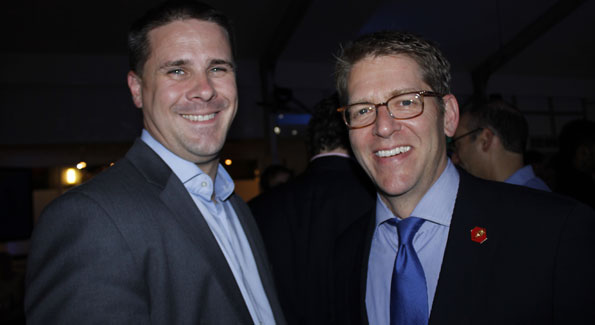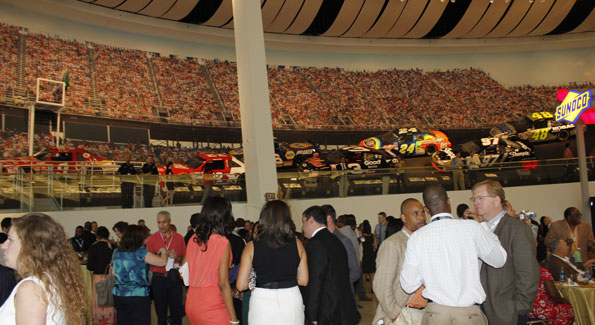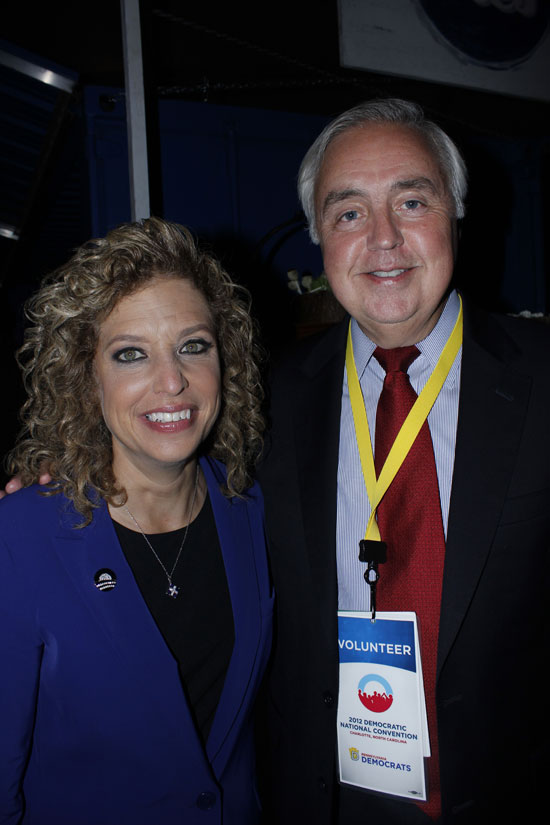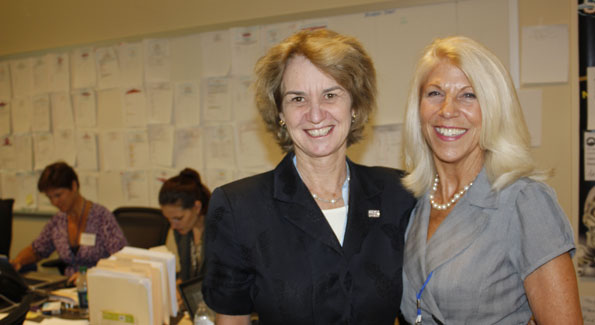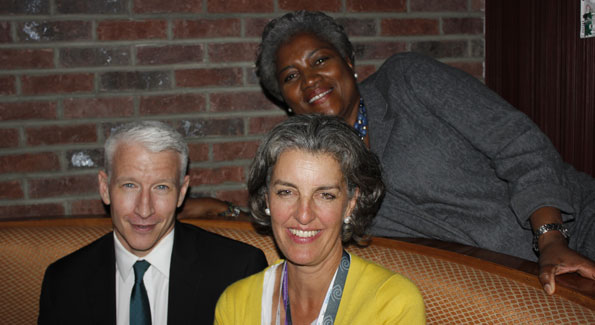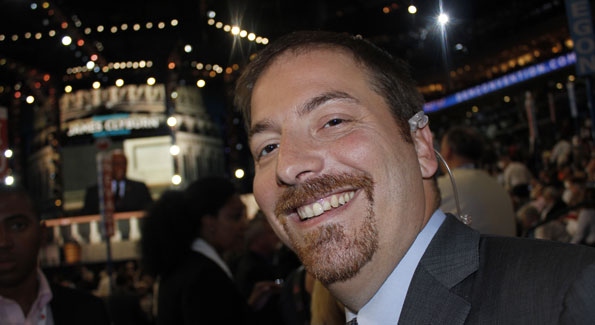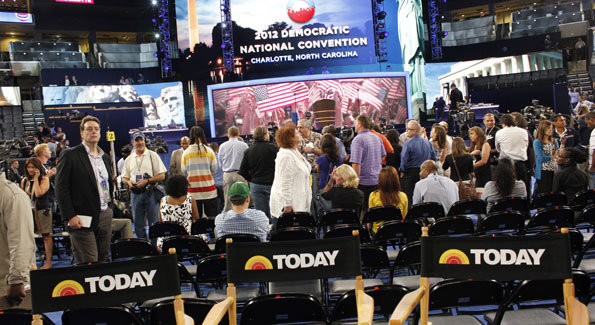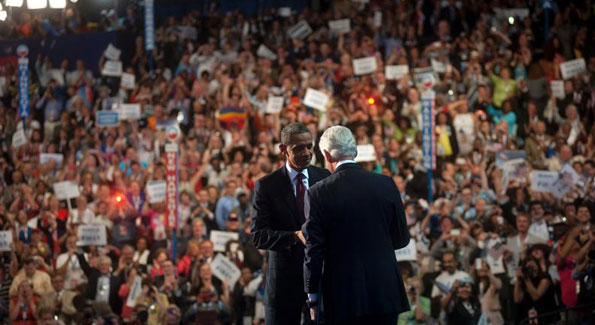Electrifying week of parties, politics and salutes wraps up DNC convention.
By John Arundel
Besides the bullhorn-bearing sidewalk preachers and “pro-life” protestors, the throngs of lanyard-bearing delegates and media clogging the already security-clogged sidewalks of Charlotte, there probably was no surer sign that I’d arrived at the Democratic National Convention than when the cheery clipboard volunteer greeted me at the doors of NASCAR’s World Headquarters and chirped: “Are you here for the Mitt Romney Talking Points Off the Record BBQ for Journalists?”
In fact, I was not.
I politely informed the young lady in pearls and pumps that I’d actually made the seven-hour trek that day from D.C. to Charlotte, down 364 miles of Interstate and deep into the Barbecue Belt of Western Carolina not to be served any free barbecue or beer from either Mitt Romney or Paul Ryan.
After a week of maxing out my C-SPAN on the wall-to-wall, windy rhetoric coming out of Tampa, I’d actually willfully and eagerly driven to Charlotte to catch the noisy clatter of Democratic conventioneers and their own spirited rhetoric, as they made their case for Obama/Biden, four more years.
My companion, a venture capitalist from Virginia Beach named Rob, chided me for not accepting the cheerfully proffered invite, arguing that perhaps the Democratic National Committee might pay my rent for three months if I took copious notes and then handed them over to one of their top strategists. Ever the economic opportunist, that Rob.
So after politely directing me to the back of the museum to hear the Democrats, several minutes later we passed through a gauntlet of more clipboard-wielding young ladies, this time wearing “Obama, Y’all!” T-shirts and into the first of what appeared to be a gazillion bourbon-soaked and caffeine-fueled events celebrating the re-nomination of Barack Obama and Joe Biden.
As we entered the “Delegate Welcome Event” at the NASCAR Hall of Fame staged by the Charlotte Host Committee for delegates and media from North Carolina, South Carolina, Virginia, Georgia and Tennessee, we were greeted by one of my all-time favorite Virginia Democrats, former State Delegate and now State Party Chair Brian Moran. “Welcome to Charlotte!” Moran effused. “It doesn’t get better than this, does it?”
In fact, for political junkies/race car enthusiasts and convention trolls like myself, it actually doesn’t. The mood: Upbeat. The conversation: All politics/All the time. The beer? Pouring from seven spigots (I counted).
And the tables were heaped high with regional Southern favorites, including shrimp and grits (South Carolina), blackened mahi-mahi on soft tortillas with shredded cabbage and pico de gallo (North Carolina), pan-seared coastal shrimp on a bed of stone-ground grits, tasso gravy and pepper confit (Virginia).
This must be where the political term “grits line” came into being; those who eat grits for breakfast, noon and dinner (Southern Democrats) and those who don’t (Yankee Democrats).
Charlotte is also the birthplace of stock car racing, and what better place to frame the opening moments of their quadrennial fest for Southern Dems than the NASCAR museum, with its 40,000 square feet of pure racing excitement, with the retired stock cars of Hall of Fame inductees Richard Petty, Dale Earnhardt and other racing legends forming the perfect backdrop for the opening speakers.
“We’ve planted our flag in the South!” said Rep. Debbie Wasserman Schultz, the DNC chair, standing behind the legendary Darrell Waltrip’s iconic ’82 Mountain Dew car. “This week we will show the world how we run a convention, and put North Carolina in the win column. And maybe those winning crumbs will fall down to the rest of the US…In the next 65 days voters will see a real stark choice.”
“I can’t tell you how many times Debbie has visited Charlotte over the past 16 months,” said Charlotte’s Mayor Anthony Foxx, who at 38 is the youngest elected mayor in the city’s history and the first Democrat since Harvey Gantt left office in 1987. “She has an incredible week lined up for all of you here in Charlotte.”
For months Schultz had been chided by Big Labor for choosing Charlotte, given North Carolina is a Right to Work state. Accordingly, the labor unions declined to buy skyboxes or host major events last week. But despite the griping, all seemed forgiven during convention week. “We’re reinvigorated to re-elect President Obama because the GOP ticket is still so anti-union,” AFL-CIO President Richard Trumka told me.
“Yes, we have the future!” Los Angeles Mayor Antonio Villaraigosa, the convention’s honorary chairman, told the Southern delegates, firing them up faster than a roadster at Charlotte Speedway. “I agree with my colleague Paul Ryan that we’ve come to that proverbial fork in the road … We will not take the low road offered by Dr. Gloom and Mr. Doom. We will take the high road to the future. We will not run away from Obamacare because we’re very glad Obama cares.”
The delegates ate it up quicker than the red meat being served on BBQ skewers. Afterward we wandered over to the Capital Grille for “You Can’t Get into this Party 3” hosted by D.C. über lobbyists Patrick Murphy and David Culver, but the name of the party was more than just intriguing. It turned out to be an insurmountable conquest; they actually weren’t letting anyone in.
On Labor Day, the gavel was still a day away from dropping, but the media and advocacy groups had stepped into full gear, with morning policy briefings hosted by POLITICO, The National Journal/Atlantic and The Creative Coalition, golf outings for the DNC’s biggest givers to Pinehurst and hospitality suites for lunch.
The Democratic conventions (and I’ve been to four) are often defined by the Hollywood starpower they draw, and by the nearby music halls rocking ’til the wee hours long after the last speakers leave the podiums.
This convention was no exception, with Freddie Wyatt of the Georgetown-based event production company Jamestown Entertainment leaving perhaps the most indelible mark, after a similar blowout week in Tampa. “I think after this week we helped make politics into something hipper and cooler than it already is,” said Wyatt, the D.C. events impresario.
After working to land sponsors like the Distilled Spirits Council, Ciroc Vodka, The Creative Coalition, The Hill newspaper, the National Association of Homebuilders and the National Restaurant Association, Wyatt joined forces with Noah Lazes, owner of the Music Factory, to sponsor some of the most memorable post-gavel blowouts of the convention.
Think B52’s, one of the world’s truly great party bands, and band members of Billy Idol, The Cult, Jane’s Addiction, Guns N’ Roses and Alanis Morissette taking the stage for memorable riffs.
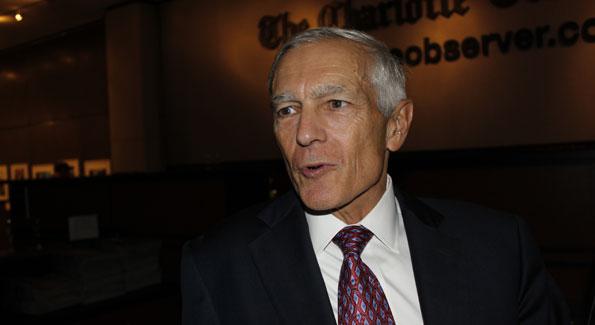
Gen. Wesley Clark at a reception held at The Charlotte Observer honoring a photo exhibit on Robert F. Kennedy
The tent was also part of the massive Media Welcome Event hosted on Saturday by the Charlotte in 2012 Convention Host Committee and which took over the entire Music Factory. It was open to as many as 15,000 members of the media who were credentialed by the Senate Press Gallery.
To accommodate them, Wyatt installed a “Kentucky Derby-style” tent with a custom-made interior that his team set up in the Fountain Plaza courtyard at the NC Music Factory, which connected to different venues within the Music Factory, depending on the event, and could host up to 1,500 raucous revelers at a time.
Wyatt’s venue had a very sexy, warm appeal about it, with overstuffed couches, buffet tables and multiple stand-up bars serving variations of Sean P. Diddy Combs’ Ciroc Vodka.
Next door, The Fillmore was also hopping. The Foo Fighters performed for Rock The Vote, with all 1,500 tickets gobbled up within 17 minutes of going on sale, and The Recording Industry Association of America sponsored a charity benefit for Musicians On Call, featuring the Grammy Award-winning artist Common.
The Democratic Governors Association played late-night host at Mez in uptown Charlotte’s Epic Center, while the Funny or Die event presented by IMPACT Arts + Film Fund’s Kimball Stroud of D.C. honored creativity and brought out the Hollywood starpower, with Zach Braff and his model girlfriend Taylor Bagley, Jessica Alba and Cash Warren, Elizabeth Banks, Alexis Bledel and Elizabeth Braff doing star turns at 5 Church restaurant and bar.
On the convention’s final night, the biggest party of the week was thrown by the ever-flush Google, which earlier in the week planted its flag in a downtown parking lot with giant shipping crates cobbled together, painted in the Google color scheme, of course. The mini Googleplex came complete with sofas and chairs, a Google Bytes refreshment bar, TV monitors to watch the proceedings, free Wi-Fi, cell phone charging stations, a TV studio and one of those cool Google self-driving cars parked out front.

Paul Pelosi Jr., the rapper M.C. Hammer, Sen. Bob Casey and his daughter at the Google party. Photo by John Arundel.
Their post-gavel party was equally as creative, with something called a “bacon bar” which featured nine different types of bacon on a stick. Its glamorous wait staff passed hors d’oeuvres which were identified on their T-shirts (how clever). Guests included Minnesota Sen. Amy Klobucher, New York Sen. Charles Schumer, Rhode Island Sen. Sheldon Whitehouse, San Francisco Mayor Ed Lee, White House spokesman Jay Carney and White House Communications Director Dan Pfeiffer.
Perhaps the best “power spot” in Charlotte was the CNN Grill, a pop up restaurant across from the Time Warner Center which was a revolving door of the biggest names in politics and media. On the night we visited, CNN’s Wolf Blitzer was dining with his producers and The Nation’s David Corn at one table, while CNN’s Anderson Cooper sat in the corner booth, conferring with power Dem Donna Brazile and other luminaries.
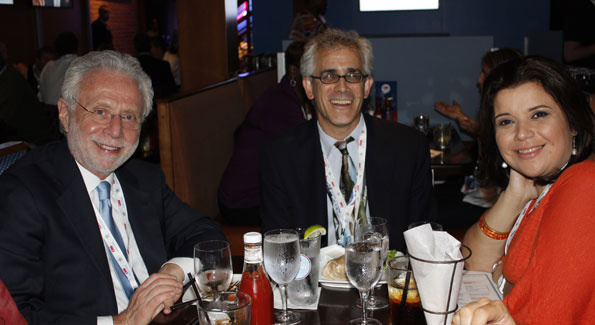
CNN's Wolf Blitzer, The Nation's David Corn and CNN political contributor Ana Navarro at the CNN Grill. Photo by John Arundel.
Meanwhile, the stunning actress Rosario Dawson was holding court with Latino activists at another table, preparing for a rally the next day for her principal cause, Voto Latino.
The CNN Grill was invite-only, so there was no check and no tipping allowed for all the hot wings, pulled pork sandwiches, veggie burgers and blackened grouper one could humanly consume, washed down with “CNN Brews on Tap” and a choice of banana pudding or fried apple pie for dessert.
“If CNN is going to be in the restaurant business for eight days every four years, we better do it right,” said David Cohn, 39, of Washington, D.C., whose Civic Entertainment Group originated the idea for CNN in 2004 for the Republican convention in New York. “Conventions are the Super Bowl of politics.”
And there was no better evidence of that than at the Time Warner Cable Arena, where 3,000 delegates, 6,000 guests and nearly 11,000 members of the media could find the strongest possible dosage of partisan politics any night of the week.
Known usually as the home to BET founder Bob Johnson’s Charlotte Bobcats, rodeos, wrestling events and circuses, the $260 million arena built in 2005 quite literally rocked all week to the plaintive pleas of Dems making their case for four more.
On the opening session, Jimmy Carter, Martin O’Malley and Tim Kaine spoke forcefully, followed by keynote addresses by 37-year-old San Antonio Mayor Julián Castro (who told delegates that “the Romney-Ryan budget doesn’t just pummel the middle class, it dismantles it!”), and first lady Michelle Obama, who electrified the crowd by focusing on the Barack Obama she fell in love with, and the strength of the American spirit and those in the military.
“Barack knows what it means when a family struggles,” she said. “Barack knows the American dream because he’s lived it.”
The star of the convention? The conventional wisdom appeared to be Bill Clinton, who gave a rousing, ringing endorsement of Obama, who embraced him afterward onstage. The former president told rapt Dems that Obama “inherited a wrecked economy” from his Republican predecessor, George W. Bush, and then laid the foundation for millions of good new jobs.
“If you want a you’re-on-your-own, winner-take-all society, you should support the Republican ticket,” Clinton said. “If you want a country of shared prosperity and shared responsibility — a we’re-all-in-this-together society — you should vote for Barack Obama and Joe Biden.”
A poll released this week by the Pew Research Center said 30 percent of those asked felt Clinton’s speech was the highlight, compared to 16 percent who felt Obama’s speech the following night was the top moment. But on the tweets-per-minute barometer, Barack Obama easily won the conventions with 52,000 tweets per minute sent during his speech, compared with Michelle Obama’s 28,000 and Bill Clinton’s 22,000. At the Republican convention in Tampa, Mitt Romney got 14,000 tweets per minute.
But everyone’s personal favorite appeared to be Jennifer Granholm, the former Michigan governor and self-described “happy warrior” who lifted up the crowd by the lapels and held them swaying for two minutes with her dizzying speech on the job losses that could have resulted if Mitt Romney were president and had allowed the auto industry to fail.
In a fiery address, Granholm shouted out the state job numbers until she arrived at Michigan (“211,000 good-paying, American jobs!”) and then stepped away from the podium, repeatedly pumping her fist into the air.
Bowing to the extra allotment of prime-time network TV coverage, the final night held perhaps the best speeches and entertainment of the week. Former Arizona Rep. Gabrielle Giffords led the Pledge of Allegiance, and James Taylor, Mary J. Blige and the Foo Fighters further revved up the crowd for remarks by actresses Scarlett Johansson and Kerry Washington, Caroline Kennedy, John Kerry and actress Eva Longoria, the recently appointed Obama Campaign co-chair.
Obama stepped onto the stage, eliciting several minutes of applause, before giving a speech that was not so much about hope and change, as in 2008, but about grim determination.
It was the speech of an incumbent president saddled with a rotten economy. “There was about as much hope in there as America can afford right now,” Richard Adams of Britain’s Guardian newspaper wrote, “and that’s not so much.”
“America, I never said this journey would be easy, and I won’t promise that now,” Obama said. “Yes, our path is harder — but it leads to a better place. Yes, our road is longer — but we travel it together. We don’t turn back. We leave no one behind. We pull each other up. We draw strength from our victories, and we learn from our mistakes, but we keep our eyes fixed on that distant horizon, knowing that Providence is with us, and that we are surely blessed to be citizens of the greatest nation on Earth.”
With that, the convention was over, the candidates went off to batter the swing states ahead of the debates next month, and weary delegates and punch-drunk journos made for home to rest up for the long sprint to Nov. 6.
(UPDATED: An earlier version of this story incorrectly identified Jim Brown, pictured with Debbie Wasserman-Schultz, as Richard Strauss.)

